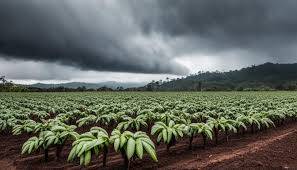Cocoa Under Threat: The Impact of Climate Change on Yields
Climate change is an urgent global challenge, significantly impacting various sectors, including agriculture. Among the most affected crops is cocoa, the primary ingredient in chocolate, which relies on specific climate conditions for optimal growth. Increasing temperatures, erratic rainfall, and shifting weather patterns threaten cocoa yields, prompting a need for sustainable farming practices to mitigate these effects.
Cocoa trees thrive in humid, tropical climates with stable temperatures between 20-30°C (68-86°F). However, rising global temperatures have led to adverse conditions for cocoa cultivation. Studies indicate that a temperature increase of just 2°C can reduce cocoa yields by up to 50%. Additionally, climate change results in unpredictable rainfall patterns, with some regions experiencing prolonged droughts while others face excessive rainfall. These extremes can lead to soil erosion, reduced soil fertility, and increased vulnerability to diseases, all of which further diminish cocoa production.
The impact of climate change on cocoa farming extends beyond yield reduction. Smallholder farmers, who make up around 90% of the world's cocoa producers, are particularly vulnerable. Many rely on cocoa as their primary source of income, and declining yields threaten their livelihoods and food security. As climate-related challenges intensify, these farmers may be forced to abandon traditional practices that have sustained them for generations, potentially leading to increased deforestation and biodiversity loss.
To combat these challenges, there is an urgent need for sustainable farming practices. Agroforestry, which integrates cocoa cultivation with tree planting, can enhance biodiversity, improve soil health, and provide shade for cocoa trees, mitigating temperature extremes. Additionally, adopting climate-resilient varieties of cocoa can help farmers adapt to changing conditions while maintaining productivity.
Education and training programs that promote sustainable farming techniques are essential for empowering farmers to adapt to climate change. Organizations and governments must collaborate to provide resources, financial support, and research on climate-smart agriculture. By prioritizing sustainability, the cocoa industry can better protect its future, ensuring that cocoa remains a viable crop for generations to come.
In conclusion, the impact of climate change on cocoa yields is profound, necessitating immediate action to implement sustainable farming practices. Protecting the future of cocoa farming is crucial not only for farmers but also for the global chocolate industry and consumers who cherish this beloved treat.



No comments yet
Be the first to share your thoughts!